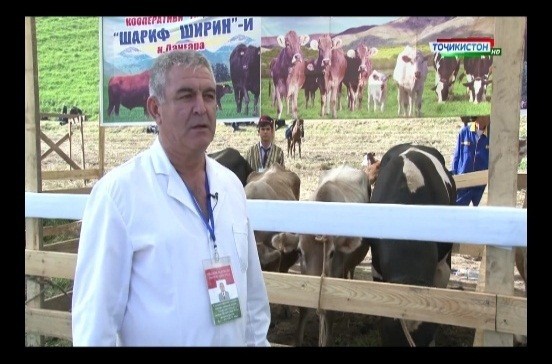Speeches Shim

Due to low livestock yield and dairy cow productivity in Tajikistan’s agriculture sector, farms are replacing their existing dairy cattle with more productive ones through natural and artificial insemination. The Feed the Future Tajikistan Agriculture and Water Activity supports efforts to introduce more productive dairy cow breeds through a cost-share program focused on technical and financial assistance to value chain actors like Abduvali Obidov, who has been working as a veterinarian for public and private enterprises for over 30 years. In cooperation with the project, Obidov has established and now operates a fully equipped artificial insemination point with the goal of providing high quality veterinary services, including natural and artificial insemination, to improve the genetics of local dairy cattle. In the long run, this will lead to increased dairy and meat production in Khatlon district where the project is operating.
The project’s cost-share intervention assisted Obidov in opening a private insemination point in Jomi district, provided him with locally sourced pure bred Brown Swiss Bulls and equipment for both natural and artificial insemination, and trained him on proper insemination techniques. In the two years since its opening, Obidov's insemination point has inseminated 246 livestock in the region, yielding 231 calves (109 males and 122 females) that are more productive in terms of meat production than traditional livestock cattle breeds. The milk yield of female offspring is also expected to be increased relative to local cows when they begin producing milk at two years old.
During the same period, Obidov’s clinic also vaccinated over 12,000 cattle against highly contagious diseases such as foot-and-mouth disease and anthrax. The clinic earns TJS 94 (equivalent of about $10) per insemination and 1.5 Somoni (equivalent of about $0.16) per vaccination, totaling 50,000 Somoni (about $5,400) in revenue since launching operations.
The living standard of Obidov and his family improved markedly after opening a veterinary clinic and artificial insemination point. Obidov said that “many of [his] fellow veterinarians left for Russia to work as migrant laborers. [They] are hardly making ends meet, but thanks to the artificial insemination point and the veterinary clinic, I have a steady source of income and am continuously improving the living standard of my family. And I use part of my income to expand and equip the clinic.” The Feed the
Future Tajikistan Agriculture and Water Activity runs from 2015 to 2020.

Comment
Make a general inquiry or suggest an improvement.